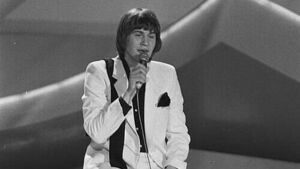RTÉ shows vision by threatening to boycott

Johnny Logan performing in the Eurovision Song Contest in 1980
ONCE upon a time people couldn’t wait for May to come around for two reasons – the summer was on its way and Ireland would enter the Eurovision Song Contest.
It may sound slightly laughable today, but there was a time when the Eurovision was a major attraction – equal to the annual Toy Show on television.
We had gone close to winning the competition in 1967 with by Sean Dunphy but in 1970 a teenager from The Bogside in Derry, Dana, stole the show – and the hearts of the nation – with .
I can still remember the banner headlines the following day; the entire country was talking about this little country’s outstanding victory. I can also remember how an astute Irish ballroom promoter had got Dana to appear in Carlow – win or lose – after the competition.
On the day of the dance, show or whatever you wanted to call it, Dana was met on the outskirts of the town and driven to Haymarket in an open top vintage car where people had gathered outside the Town Hall to see this diminutive schoolgirl who had brought honour to the country.
Ever the gracious person, Dana got someone to open a first-floor window so that she would wave to the crowd – and as is our way, someone asked her to sing the winning song, which she duly obliged in doing, accompanied by everyone in the square.
Ten years later, Johnny Logan won the contest with and went one further than anyone in 1987 when he did it for an unprecedented second time with .
What most people might not know was between both his victories at the Eurovision Johnny toured extensively, both in Europe and abroad and on one occasion played to a packed house in the Seven Oaks Hotel. Like Dana, he too was very gracious to everyone who came up to him seeking his autograph.
Our next winner was Linda Martin in 1992 with – but did you know that Linda previously came second in the competition, when, in 1984, she lost out by just six points. Her song, Terminal 3 lost out to Sweden’s whatever that meant.
Former bank official Niamh Kavanagh came next in 1993 with followed by duo Paul Harrington and Charlie McGettigan in 1994 with .
Not alone was this three in a row for Ireland – the first time that had ever happened in the competition – but it was joint hosted by Cynthia Ni Mhurchú from Carlow, now an MEP for Ireland South and the late Gerry Ryan. We also got to see a seven minute interval act which would go on to conquer the world – Riverdance.
I have never seen the show in Ireland, but in March 1996, I was in New York covering the St Patrick’s Day Parade and was lucky enough to be given a ticket to go see one of the eight sell-out shows the troupe were putting on.
Irish emigrants from all over the US had quickly snapped up the tickets for those shows, as well as an extensive sell out tour all over the US, Canada and Mexico. Thirty years later that show continues to attract huge audiences wherever it goes.
Our last winner was Eimear Quinn in 1996, but while we now struggle to get beyond the semi-final stage, we have failed to qualify for the final on 11 occasions and have even finished last on two occasions. Ireland has amassed a total of 18 top five results in the history of the competition.
We have finished second with Sean Dunphy in 1967, Linda Martin in 1984, Liam Reilly of Bagatelle fame in 1990 with and 1997 with Marc Roberts, whose birth name is Sean Hegarty, with Mysterious Woman.
But all that might come to nought next year if talks to boycott the event if Israel are allowed to enter, goes ahead. It is a pity that such a competition has to be weaponised, excuse the pun, in a bid to bring Israel to its senses. Remember apartheid and South Africa being shunned by the entire world, with it being excluded from all sorts of sporting and cultural events across the globe? I’m not saying that was the only reason why apartheid came to an end, but it was certainly a factor.
But if the war in Gaza continues and Israel ignores the condemnation it is receiving from all corners of the globe and Ireland does withdraw from the competition next year, it will not be the first time for us to do so. Back in 1983 RTÉ didn’t enter the competition due to industrial action at the station at that time.




